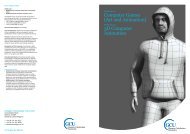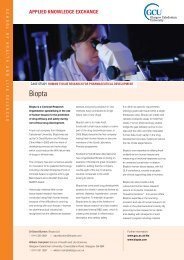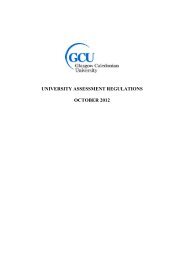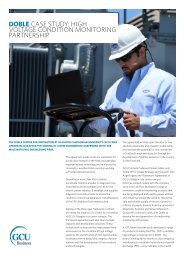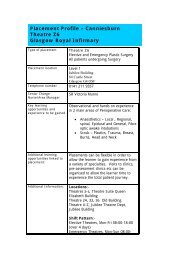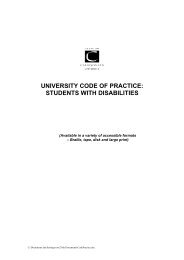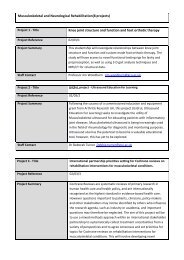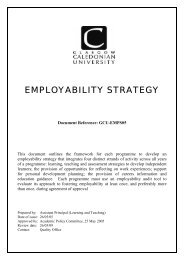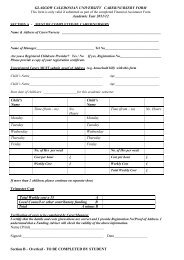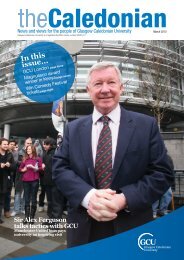Postgraduate - Glasgow Caledonian University
Postgraduate - Glasgow Caledonian University
Postgraduate - Glasgow Caledonian University
You also want an ePaper? Increase the reach of your titles
YUMPU automatically turns print PDFs into web optimized ePapers that Google loves.
MSc Forensic Psychology/Psychology in Criminal & Penal Contexts<br />
107<br />
Contact: Natalie Cohen<br />
E: n.cohen@gcal.ac.uk<br />
T: +44(0)141 331 8611<br />
W: www.caledonian.ac.uk/sls<br />
Mode of Study & Duration:<br />
Full-time: One year<br />
Part-time: Two years<br />
Number of Places:<br />
At discretion of admissions tutor<br />
UK/EU Fees & Funding:<br />
Self or employer-funded £4,080 (2008/09<br />
fees). Some PSAAS funded places available<br />
Application:<br />
Download a form from our website on<br />
www.caledonian.ac.uk/postgrad<br />
For further information, see page 124 or use<br />
the paper form at the back of this prospectus<br />
Assessment:<br />
Coursework and one examination, plus<br />
Research Dissertation<br />
Programme Structure:<br />
Semester A: Psychology of Criminal<br />
Behaviour; Psychology & the Legal Process;<br />
Professional Skills in Forensic Settings;<br />
Research Methods & Statistics<br />
Semester B: Interventions with Offenders;<br />
Psychological Assessment; Children, Young<br />
Persons & the Law; Policing & Prisons: On<br />
completion of taught modules, MSc<br />
candidates must complete a supervised<br />
research based dissertation<br />
Forensic Psychology is one of the significant areas of development in contemporary<br />
psychology. Forensic psychologists work in, or with, the prison services, special hospitals,<br />
secure units, the courts, the police and social work, probation and community mental health<br />
services; others are employed in academic or commercial settings.<br />
The <strong>Glasgow</strong> <strong>Caledonian</strong> programme is the only one of its kind in Scotland. It is designed to introduce<br />
students to relevant applications of psychology; forensic, criminological and legal issues and contexts. The<br />
programme also aims to enable students to adopt an independent, analytical and evaluation approach to<br />
learning and practice. For those with the requisite entry qualifications, it provides an important step towards<br />
professional practice and chartered status in this field: the MSc in Forensic Psychology is accredited by the<br />
British Psychological Society (BPS). It entails completion of eight taught modules and an additional research<br />
Dissertation.<br />
The programme is also designed to be of particular interest to current professionals wishing to extend<br />
or update their knowledge of a number of specific areas. It is possible to register for the diploma (eight<br />
modules), certificate (four modules) or for individual modules. Assessments for the Forensic Psychology<br />
programme are written assignments, an examination for the Research Methods module and a research<br />
dissertation.<br />
Career opportunities can range from the application of psychological techniques to the detection,<br />
assessment and treatment of offenders, to advising on selection and training of staff and the development of<br />
services. Some of the students on our programme are staff from the Scottish Prison Service.<br />
Entrants to the Forensic Psychology programme must have a good Honours degree in Psychology<br />
(2.1 or above) that is recognised by the BPS as providing the Graduate Basis for Registration (GBR), and<br />
work experience either paid or voluntary, in the field. Individuals lacking GBR, who have other relevant<br />
qualifications or experience, can be admitted to a parallel programme in Psychology in Criminal and Penal<br />
Contexts. This would normally require a 2.1 Honours degree in a relevant discipline. We welcome<br />
applications from overseas students.<br />
International Students:<br />
International students whose first language<br />
is not English shall be required to<br />
demonstrate evidence of satisfactory<br />
competence by completing an IELTS test<br />
with a score of at least 7.0 or by holding<br />
another recognised qualification. Please refer<br />
to pg 12 for details<br />
Overseas Fees:<br />
£9,500 (2009 fees)<br />
Scholarships:<br />
Partial scholarships are available and<br />
applicants will be advised of these<br />
arrangements upon receipt of an offer



